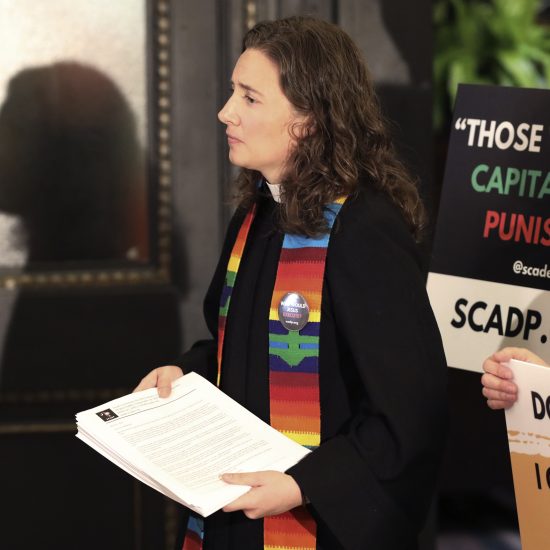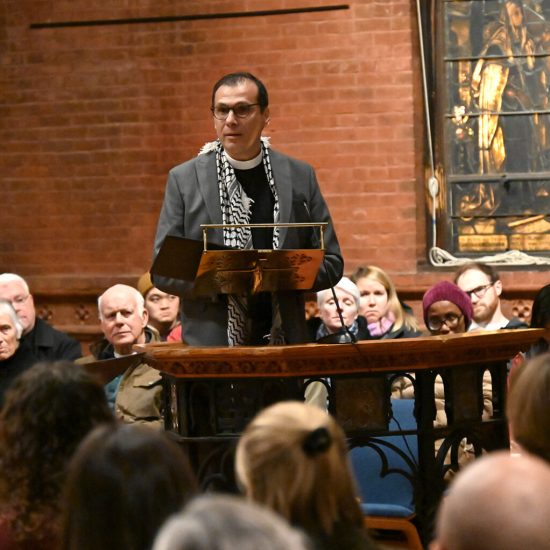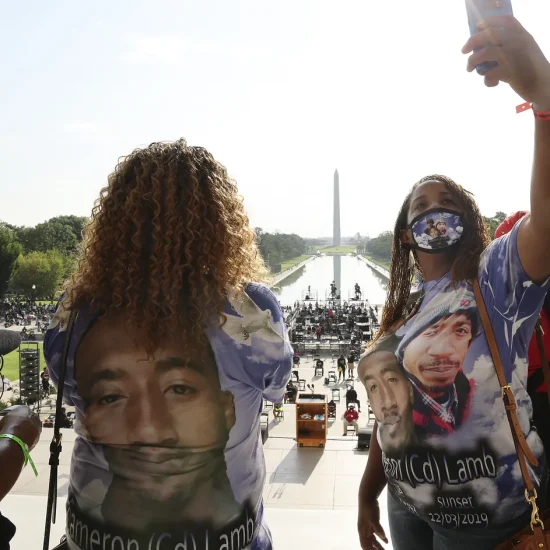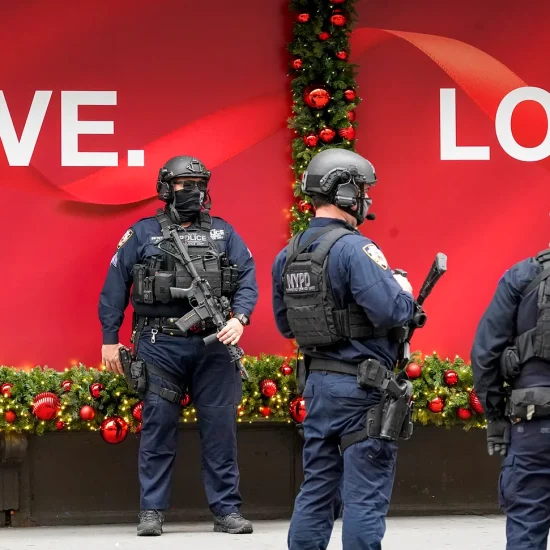
On Nov. 28, Missouri Gov. Mike Parson watched as a crane lowered a 40-foot Norway spruce onto the lawn of the Governor’s Mansion. Soon, it would be decorated with large ornaments and lit up in a special ceremony Parson would lead. But the day after the tree’s arrival, Parson took a break from saying he wanted to “wish everybody a Merry Christmas” to instead oversee a state execution.
That Parson, a Southern Baptist, refused to stop an execution even during the Christmas season isn’t a surprise. The execution of Kevin Johnson was the second in Missouri this year and the fifth since Parson moved into that mansion. But what is unusual is the scathing dissent from U.S. Supreme Court justices after Missouri went ahead with killing Johnson.
When Johnson’s last-minute appeal reached the highest court in the land, it was denied in a brief, unsigned order (as the court usually does in such cases). There was a note saying Justices Sonia Sotomayor and Ketanji Brown Jackson would have granted Johnson’s appeal. The next day, Jackson explained why in a rare execution dissent also signed by Sotomayor. The problem was Missouri officials failed to follow the law.
Last year, a bipartisan state bill — signed into law by Parson — created a process for prosecutors to vacate convictions. This has already been used to free Kevin Strickland, a Black man who spent 43 years in prison for murders he didn’t commit. And a judge this week is hearing arguments in a similar effort to free Lamar Johnson (no relation to Kevin), a Black man who has spent nearly three decades behind bars on a wrongful conviction (a case we’ve profiled at A Public Witness along with advocacy by clergy on behalf of Johnson).
That same law led a special prosecutor to seek to vacate the death sentence of Kevin Johnson. Unlike the other two cases, the issue in Johnson’s was not that of innocence. The injustice was alleged racial bias by the original prosecutor who sought the death penalty against the Black man who killed William McEntee, a White police officer, in 2005. Once a motion to vacate a conviction is filed, the new law requires a hearing. But a judge refused to schedule it and a majority of the state’s Supreme Court justices denied a motion to halt the execution for a hearing. That’s what led to Jackson’s dissent.
“A state cannot provide a process for postconviction review,” Jackson wrote, “and then arbitrarily refuse to follow the prescribed procedures. But that appears to be what happened in this case.”
She criticized the state’s justices for ignoring a “straightforward procedural statute” and offering a “fundamentally flawed” reading of the law that “amounted to a Fourteenth Amendment violation.” She also lamented that after refusing to hold a hearing that would have focused on “new evidence relating to the trial prosecutor’s racially biased practices and racially insensitive remarks,” the state’s execution of Johnson means “that evidence will not be considered on the merits by any court.”

Missourians for Alternatives to the Death Penalty led a vigil outside of Gov. Mike Parson’s office in the state Capitol in Jefferson City, Missouri, ahead of the execution of Carman Deck on May 3, 2022. (Brian Kaylor/Word&Way)
Jackson’s dissent exposes the false claim of Parson, whose office sent out a press release as that large Christmas tree showed up at the mansion. In it, Parson said he would not grant clemency since “Johnson has received every protection afforded by the Missouri and United States Constitutions.” Parson later declared December “Christmas Tree Month” in Missouri to honor how “the aroma of a real Christmas tree is a strong reminder and symbol of life.”
Jackson’s dissent, which didn’t receive the media attention it should have, offers merely the latest evidence of an unjust capital punishment system in the United States. A system often implemented and supported by those who currently celebrate the birth of the Prince of Peace. So in this issue of A Public Witness, we look at the state of capital punishment in the United States and introduce you to an upcoming execution that also raises concerns.
The State of State-Sanctioned Murder
The death penalty has a long and complicated history in the United States, so we’ll concentrate on what has come to be understood as the modern death penalty era. This begins with the case Furman v. Georgia, which was decided by the Supreme Court in 1972 — around the same time they were hearing arguments about another landmark case: Roe v. Wade.
In Furman v. Georgia the Court decided that the death penalty constituted cruel and unusual punishment, which violated both the Eighth and Fourteenth Amendments. The way that the death penalty was applied was deemed to be unequal and haphazard, disproportionately imposed on the economically disadvantaged and other marginalized groups. Because the death penalty was put on hold during the six years leading up to the Furman decision, this meant that from 1966-1976 no executions took place in the United States.
Things changed rather quickly again because many states were intent on creating a new version of the death penalty that would hold up to constitutional scrutiny. This came in the form of the 1976 decision in Gregg v. Georgia, which held that the death penalty could indeed be reinstated as long as juries were guided by certain “rational and objective” sentencing standards that would supposedly allow the process to be less arbitrary. This includes things like “aggravating circumstances” to be proven beyond reasonable doubt before death may be imposed.
How did that work out? Well, another important death penalty case decided in 1987, McCleskey v. Kemp, represented an attempt to use social science to demonstrate that race heavily impacted who was given a death sentence. Though the case failed because McCleskey could not prove racist intent in his particular case, Justice William Brennan argued in a dissent that the case decision was driven by a “fear of too much justice.” He meant that if the court began to acknowledge the very real racial disparities, the entire machinery of death would begin to unravel.

Death chamber in Oklahoma. (Josh Rushing/Creative Commons)
This brings us to today, where 1,557 men and women have been executed in the U.S. since the death penalty was reinstated in 1976. Despite a recent decline in death sentences, a number of states moving to abolish executions, and electing the first president to openly oppose the death penalty, some states are going in the opposite direction and doubling down on the practice. Oklahoma recently began its plan to execute 25 people in two years — made all the more troubling by its history of botched procedures and multiple exonerations. Since many pharmaceutical companies do not want their drugs used to kill people, multiple states have considered alternative methods such as the electric chair, gas chamber, hanging, and firing squads.
Additional concerns also emerge with individual cases. For instance, in Missouri, it’s not just Kevin Johnson’s recent execution that sparked criticism. The two executions before that also revealed other injustices in the justice system: Ernest L. Johnson was severely intellectually disabled but was executed as Gov. Parson ignored pleas for clemency from Pope Francis and others; and Carman Deck endured a pattern of childhood abuse and neglect as the social safety net and criminal legal system failed him. Now the Show-Me State is planning another execution in three weeks.
Help sustain the ministry of Word&Way by subscribing to A Public Witness!
Amber McLaughlin
In 2006, Amber McLaughlin was sentenced to death for the murder of her ex-girlfriend, Beverly Guenther. As is the case with nearly everyone on death row, the story of McLaughlin’s life is filled with both personal tragedy and systemic failures.
She was exposed to alcohol in the womb and experienced extreme abuse and neglect as a young child, leaving her borderline intellectually disabled. McLaughlin’s birth parents gave her up, separating her from her birth siblings, and she was placed in foster care before she was adopted at the age of five. Unfortunately, her adoptive parents only continued the cycle of abuse. This ranged from her adoptive father, a police officer, tasing her and beating her with his nightstick to both parents putting a lock on the cabinets so McLaughlin and her siblings could not access any food.
There are a number of things about this trial that should worry anyone invested in a just outcome. Chief among these issues is McLaughlin’s flawed counsel and the “Dr. Caruso fiasco.”
Her defense attorneys promised the jury that during the sentencing phase the foundational part of their case for life in prison would be mitigating evidence concerning her state of mind at the time of the crime. Psychiatrist Keith Caruso was supposed to present this evidence, but the defense attorneys became aware that he had falsified some research data while in school. Despite the fact that this issue was easily overcome in previous (and subsequent) cases, the attorneys made the baffling decision not to call Caruso as a witness, leaving no expert testimony regarding McLaughlin’s mental health.” This specifically meant that the “aggravating circumstances” required by Gregg v. Georgia‘s sentencing standards went largely unchallenged and the jury never received what they were promised.

Amber McLaughlin. (Jeremy Weis)
It is also worth mentioning problems with the prosecution. Former St. Louis County Prosecuting Attorney Bob McCulloch, who oversaw McLaughlin’s case, successfully pushed for death sentences for 23 people. McCulloch was also behind Kevin Johnson’s case (whose execution Justice Jackson penned her dissent about), as well as the case of Leonard Taylor, who is scheduled to die on Feb. 7. McCulloch is almost single-handedly responsible for St. Louis County ranking sixth among U.S. counties with the most executions. Overusing his sentencing powers to put people to death was among the issues that got him ousted in his first reelection race after Michael Brown’s killing in Ferguson (when he refused to bring charges against the police officer who killed Brown). But that does not retroactively change the cases he had already prosecuted.
Despite all this, the jury in McLaughlin’s case was deadlocked. That’s right, a jury did not actually sentence McLaughlin to death; a judge did. And while that is supposed to be unconstitutional, Missouri enjoys a legal workaround that allows a trial judge to overrule a deadlocked jury and impose a sentence of death. The most severe and irreversible punishment our criminal legal system has to offer came down to a loophole.
McLaughlin is currently scheduled to die three weeks from today, on Jan. 3. She has exhausted almost all legal options at this point and her best hope is for Gov. Parson to commute her sentence to life in prison. Clearly, that is a long shot — and perhaps even more so considering McLaughlin is a trans woman.
Get cutting-edge reporting and analysis like this in your inbox every week by subscribing today!
‘Tis the Season?
While the recent execution of Kevin Johnson made for a jarring contrast with the festivities at the Missouri Governor’s Mansion, the upcoming execution of Amber McLaughlin will do so even more dramatically. Even as state officials fill government buildings with symbols and messages celebrating Christmas, it doesn’t seem they are actually paying attention to those decorations.
McLaughlin’s execution will occur during the famed “12 days of Christmas” we often sing about, which actually start on Christmas instead of ending on that day. The period leads up to Epiphany on Jan. 6 when many Christians commemorate the visit of the Magi.
“The execution is scheduled for the Tenth Day of Christmas,” McLaughlin’s attorney Larry Komp told us. “There has not been a Christmas execution in Missouri in the history of the modern death penalty. This is the closest execution to Christmas in 40 years, and the second closest to Christmas in the United States in the modern death penalty era.”
We’re not saying that government officials have to live out Christian teachings. But if they are going to make a big deal about their professions of faith with lights, parties, and special messages about Christmas, we will call them out for hypocritically ignoring the very message of the holiday they claim to celebrate.
“This is the season Christians around the world celebrate the birth of Christ, the ‘Prince of Peace,’” Shane Claiborne told us. “We believe that Jesus came to show us what God is like with skin on, love made flesh — as we say at Christmas, ‘Emmanuel,’ meaning “God with us.”
“The death penalty is an offense not just to the holiday season, but to everything Christ lived and died for,” added Claiborne, who wrote Executing Grace: How the Death Penalty Killed Jesus and Why It’s Killing Us. “At the heart of our faith is an executed and risen Savior who taught us to love and forgive and to trust that no one is beyond redemption. Anytime we defend the death penalty we betray the power of Christ to redeem, restore, and transform all human beings.”

Artists paint on boards protecting businesses in Ferguson, Missouri, on Nov. 26, 2014. (Jeff Roberson/Associated Press)
Even this time of year somehow fails to invoke thoughts of mercy, peace, or life for many politicians claiming to follow Emmanuel. Missouri killed Kevin Johnson on the third day of Advent. Mississippi plans to execute Thomas Loden Jr. tomorrow (Dec. 14) on the 18th day of Advent and just 11 days before Christmas. Idaho and Oklahoma both wanted to execute someone on Thursday (Dec. 15) but are unable to do so because of factors outside the states’ control.
Of course, a governor killing people is sadly part of the Christmas story, but we don’t think that’s who these governors think they are dressing up as in this real-life pageant. Yet, this is also a season when we celebrate that people can change. Ebenezer Scrooge. The Grinch. So we don’t give up hope that people will decide to choose life.
That’s why Christians should raise their voices against capital punishment any time of the year but especially at Advent. There are state and national advocacy groups we can join and work with to kill the death penalty. In the case of McLaughlin’s upcoming execution date, there is a petition asking Gov. Parson to commute the sentence to life in prison.
Let’s not just raise our voices to sing Christmas carols. May we also be among those working to bring a little more peace on Earth.
As a public witness,
Brian Kaylor & Jeremy Fuzy






